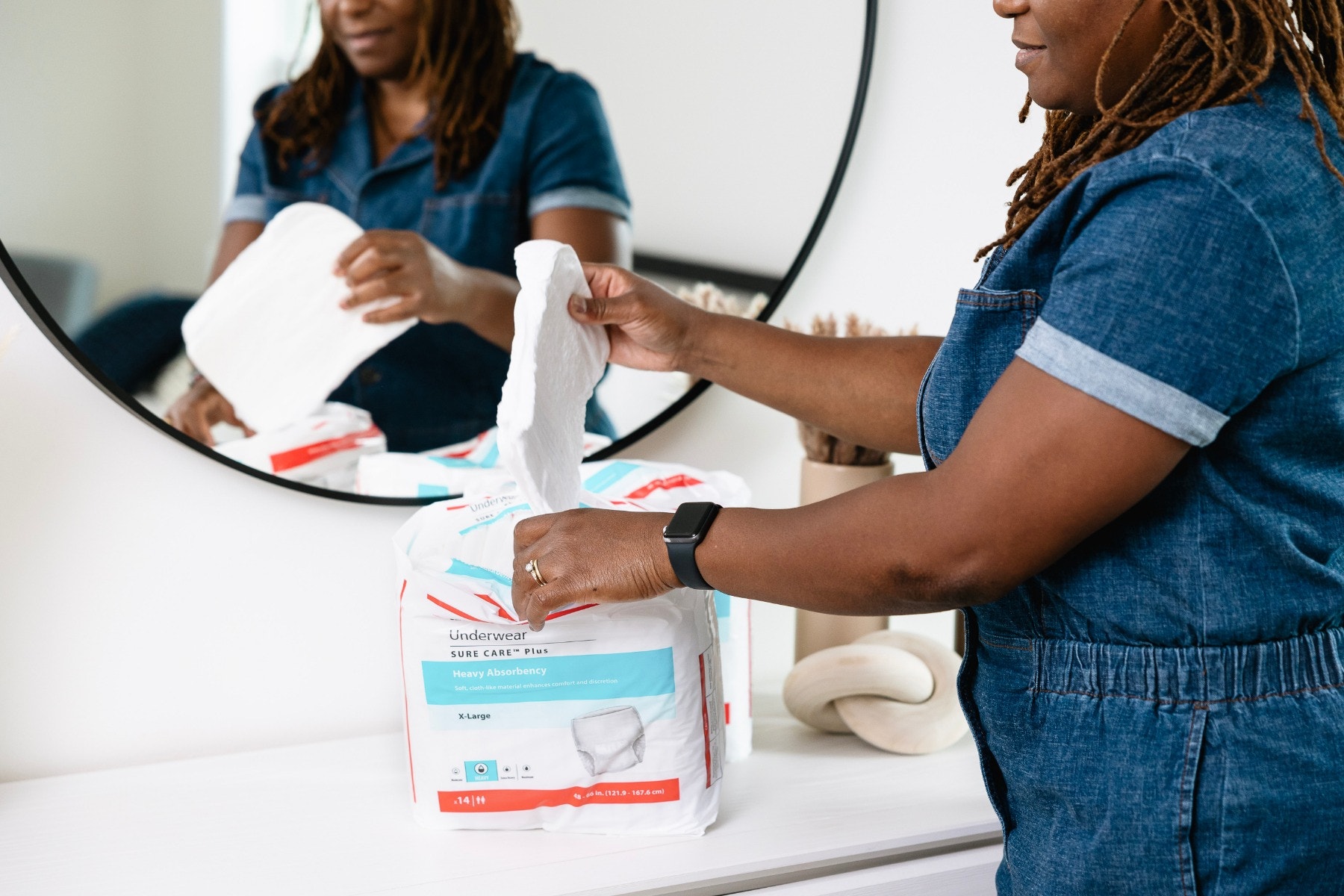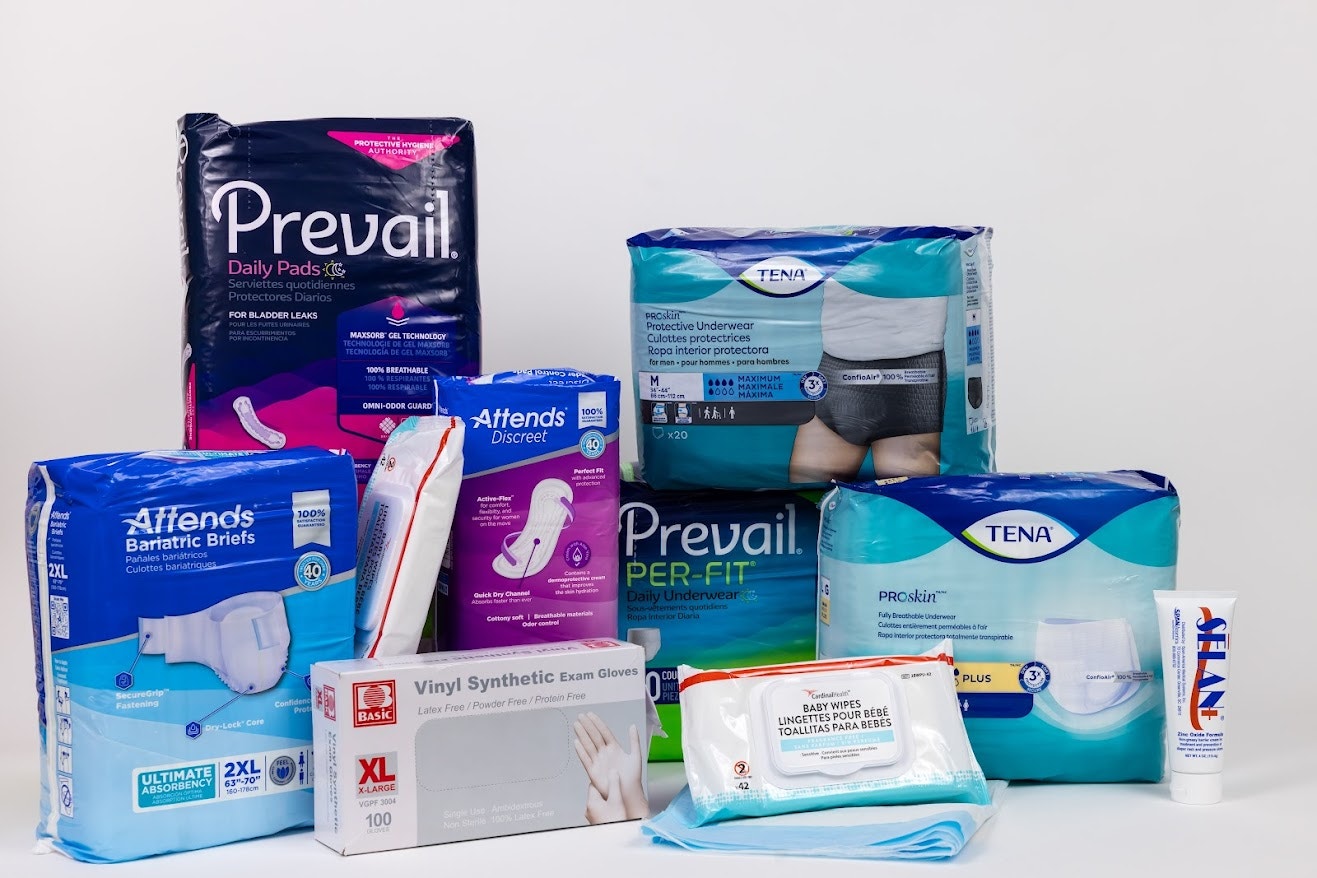Key Takeaways:
-
Durable medical equipment refers to medically necessary items used long-term in the home.
-
People managing a medical condition, disability, or injury often rely on this type of equipment.
-
Aeroflow Urology can help you get free incontinence supplies through Medicaid and ship them straight to your door, if you qualify.
If you or your loved one has a medical condition, a disability, or are recovering from an injury, medically necessary items can make everyday life safer and more comfortable. These types of items are known as durable medical equipment (DME) supplies, and are made for long-term home use.
DME may be covered by Medicaid, Medicare, and private insurance, though the rules vary depending on your state and insurance plan.
Some items, such as incontinence supplies, are unfortunately not covered by Medicare, but are often covered by Medicaid. This article explores what you need to know about DME and how you can get them covered by insurance.
What Is Considered Durable Medical Equipment?
For equipment to qualify as DME, it must be made for repeated use. It can come in many forms — some equipment helps with mobility, while others support incontinence, sleep, or daily care.
Medicaid and Medicare may cover the cost of DME if a healthcare provider prescribes the equipment and if you meet certain requirements. However, incontinence supplies, such as adult briefs, bladder control pads, pediatric diapers, pull-ups, and more, are typically only covered by Medicaid.
Some of the most common types of DME include:
- Incontinence supplies: Diapers, pull-ons, bladder control pads, underpads, gloves, and wipes.
- Mobility aids: Walkers, canes, crutches, scooters, or power wheelchairs.
- Bathroom safety equipment: Bedside commodes, raised toilet seats, or shower chairs.
- Respiratory equipment: Portable oxygen tanks, nebulizers, or continuous positive airway pressure (CPAP) machines.
- Monitoring and testing devices: Blood sugar monitors, test strips, or blood pressure cuffs.
- Beds and support surfaces: Hospital beds, pressure-reducing mattresses, or patient lifts.
- Orthotics and prosthetic devices: Braces, artificial limbs, or orthopedic supports.


Check your coverage for 100% free incontinence products now!
Check your coverage for 100% free incontinence products now!
What Is the Main Difference Between DME & Medical Supplies?
Durable medical equipment: Refers to items that are built to last and can be used again and again, like wheelchairs, walkers, or hospital beds. These products are usually prescribed to help manage a health condition over time and are intended for use at home rather than in a hospital setting.
Medical supplies: These items are typically disposable and meant for short-term or one-time use. Common examples of medical supplies include syringes, bandages, or gloves.
Some products, like incontinence supplies, fall into a gray area between DME and medical supplies.
Even though they’re disposable medical supplies, certain health insurance plans (especially Medicaid) may consider them as DME if they’re medically necessary and used to treat a long-term condition.
Do I Have to Buy DME, or Can I Rent It?
Depending on your health insurance, some equipment can be rented instead of purchased.
Equipment like hospital beds or wheelchairs are often rented if you need them for a short time, while others can be bought outright if a healthcare provider says you have a medical reason for using the equipment.
Does Medicaid Cover Durable Medical Equipment?
In most cases, yes.
Medicaid often covers DME if it’s prescribed by a healthcare provider and you or your loved one meet state-specific Medicaid requirements.
Need help confirming your Medicaid coverage?
Aeroflow Urology can help you confirm your coverage and work with Medicaid to simplify the process of getting incontinence supplies. If you manage incontinence and have a qualifying medical condition or special need, you may be covered for free protective supplies, such as:
- Adult diapers (briefs).
- Adult underwear (pull-ons).
- Bladder control pads.
- Booster pads.
- Pediatric diapers.
- Pediatric pull-ups.
- Underpads (chux).
The products you or your loved one are eligible for will depend on the state you live in, your specific insurance plan guidelines, and your qualifying diagnosis.
We deliver your products straight to your home in discreet boxes each month — no more last-minute store runs!
Reordering is simple, too: just use our online portal or reply “Yes” to our refill text.
Does Medicare Cover Durable Medical Equipment?
Medicare covers some prescribed DME, such as wheelchairs, walkers, and hospital beds.
However, at this time, Medicare does not deem incontinence supplies as medically necessary, so they typically aren’t covered under this plan.
Where to Find Durable Medical Equipment Suppliers
Trying to find the right supplies for your needs can be overwhelming, especially when you require them on a monthly basis.
If you’re looking for incontinence products that get delivered quickly and discreetly, Aeroflow Urology has you covered! Plus, you get free shipping on each order.
Join the 2 million+ customers who trust us to verify their insurance coverage!
Check your coverage for 100% free incontinence products now!
Check your coverage for 100% free incontinence products now!
Frequently Asked Questions
How long does it take to get approved for DME?
The approval process depends on your insurance (Medicaid, Medicare, or private) and where you live. Once a medical professional sends the order and paperwork, insurance reviews it. Most people receive their equipment within a few days to a few weeks.
Can kids get DME covered through Medicaid?
Yes. Many children who qualify for Medicaid can get equipment like feeding pumps, adaptive strollers, and incontinence supplies covered if it’s tied to a medical need. This means you’ll need to get your child a prescription for DME from a healthcare provider.
I didn’t qualify for DME through Aeroflow Urology, what now?
If you filled out our form and you didn’t qualify, you can still get incontinence products from pharmacies or medical supply stores, but they may not accept Medicaid. If your insurance changes, you can use the Aeroflow Urology Eligibility Form to submit your information again to see if you qualify for supplies with the new coverage.
References:
Centers for Medicare & Medicaid Services. (n.d.). Where can people get help with Medicaid or CHIP? Medicaid.gov. https://www.medicaid.gov/about-us/where-can-people-get-help-medicaid-chip
U.S. Centers for Medicare & Medicaid Services. (n.d.). Durable medical equipment (DME) coverage. Medicare.gov. https://www.medicare.gov/coverage/durable-medical-equipment-dme-coverage
Disclaimer
Information provided on the Aeroflow Urology blog is not intended as a substitute for medical advice or care from a healthcare professional. Aeroflow recommends consulting your healthcare provider if you are experiencing medical issues relating to incontinence.











